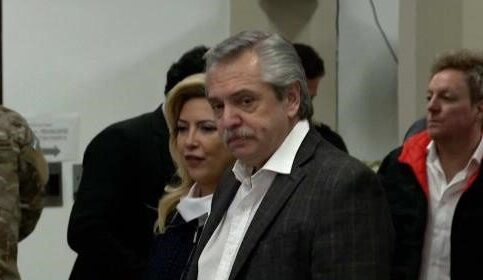BTN News: In a recent interview with the Spanish newspaper El País, former Argentine President Alberto Fernández (2019-2023) firmly denied allegations of gender violence and harassment made against him by his ex-wife, Fabiola Yáñez. These accusations have sparked a significant controversy, particularly given Fernández’s previous advocacy for gender equality during his presidency. As the situation continues to unfold, Fernández has stated that these claims should be addressed in court rather than through the media, where he intends to demonstrate his innocence. This case has drawn widespread attention, not only due to the nature of the accusations but also because it involves a former head of state who had actively promoted gender policies throughout his tenure.
Alberto Fernández has been resolute in his stance, consistently denying any involvement in the alleged incidents of violence. In his interview, he emphasized that during his 18-year relationship with the mother of his eldest son and his 11-year partnership with Vilma Ibarra, his former Secretary of Legal and Technical Affairs, there had never been any episodes of violence. He expressed disbelief over the accusations and reiterated that he has never struck a woman, insisting that the claims brought against him are entirely baseless.
The allegations surfaced when Fabiola Yáñez, Fernández’s ex-wife, reportedly filed a complaint for gender violence. Following this, Argentine media outlets published photographs showing Yáñez with visible injuries, including a bruise on her eye and marks on her arm, as well as chat messages in which she appears to hold Fernández responsible for the injuries. Despite the visual evidence, Fernández denied any connection to the injuries seen in the photos, claiming that while he recognizes the images, they are unrelated to any actions on his part. He also mentioned that certain details surrounding the images are unclear to him and pledged to clarify the situation in court.
Fernández has remained steadfast in his assertion that Yáñez’s accusations are unfounded, suggesting that she may have been influenced by others with ulterior motives. He stressed that during his presidency, he championed gender policies and is acutely aware that in cases like these, the burden of proof often shifts to the accused, necessitating that he demonstrate his innocence. Fernández expressed confidence in his ability to do so through the judicial system.
One particularly contentious aspect of the case involves a chat in which Yáñez allegedly accuses Fernández of repeatedly hitting her over the course of three days. In response, she supposedly begged him to stop, stating that she was having difficulty breathing and feeling unwell. When asked about the existence of this chat, Fernández claimed ignorance, explaining that all his messages from 2022 and 2023 with Yáñez had disappeared from his phone, leaving him unable to verify the authenticity of the exchange.
Despite the gravity of the accusations, Fernández seemed taken aback by the possibility that Yáñez might publicly accuse him. He acknowledged being aware of Yáñez’s personal situation but refrained from elaborating, citing a desire to avoid exposing her further in the media. He maintained that while people often say hurtful things in moments of anger, these should not be misconstrued as evidence of physical violence. When questioned about the possibility of verbal abuse, Fernández did not deny it outright but instead suggested that if such incidents occurred, he too was a victim of the same behavior.
Throughout the interview, Fernández repeatedly attempted to downplay the accusations, referring to them as typical arguments or disagreements that arise in any relationship, without significant consequence. He also portrayed himself as a victim of the media’s rush to judgment, lamenting what he described as a “media lynching” that preemptively labels him as guilty without affording him the chance to defend himself. Fernández acknowledged the presumption of guilt that comes with such accusations but pleaded for the opportunity to prove his innocence in a court of law.
As this case moves forward, it will be up to the judicial system to determine the truth behind these serious allegations. For now, Fernández remains adamant in his denial, expressing hope that the legal process will clear his name and bring an end to what he perceives as a trial by media.


